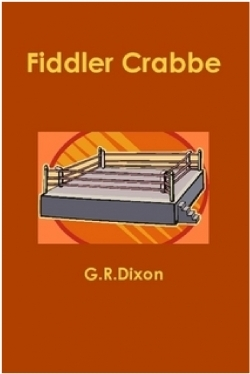Fiddler Crabbe
In the realm of popular entertainment, there are subjects, often related to sport, that show up over and over, capturing our interest in nearly every iteration. American baseball is one; another is boxing. From On the Waterfront to Rocky to Raging Bull to recent Academy-nominee The Fighter, boxing movies (and the books that inspire them) just won’t go down.
Perhaps, somewhere in the violence and the sexy, gritty mystique of that world, there is a powerful metaphor that distills the human condition into its simpler, baser elements. After all, boxing has observable rules and structure (unlike real life); straightforward means to success (knock the other guy down); and a distinct adversary (it’s the pugilist presently occupying the other corner).
G.R. Dixon’s novel Fiddler Crabbe rides in on the gritty and sexy world of boxing with an engaging premise that goes beyond “man vs. man” and “coming of age” themes. It all begins in Ireland, with a romantic (if somewhat bloodless) romance that leads to the birth of our main character. Sean Crabbe is good, kind, and utterly deformed: his left side is grotesquely large and strong. The imbalance both appeals to and repels Crabbe’s contemporaries: women are sometimes turned on by its strength and/or disgusted by its appearance. Men frequently see the promise of profit.
Indeed, it’s a mafia leader’s interest in profit that launches Crabbe’s boxing career, one which will take him far from Ireland and across the sea to New York City. On the way, Crabbe finds and loses love interests, earns faithful friends, and pounds his ill-proportioned way through fight after fight. The violence of his chosen career weighs on Crabbe, as does the predetermined outcomes of each fight, yet the money drives him to continue, at least until such time as he can win a championship title.
Yet just when Crabbe has his shot at attaining his dreams, the boxing world proves to be deadly to those who violate its fickle, tribal laws, and Crabbe must re-evaluate the life he has built for himself.
The book’s fight scenes are candid and engrossing, taking us through Crabbe’s development from self-conscious freak to “Fiddler,” the master boxer with the deadly Left. Throughout, the steady-headed Crabbe retains his consciousness of what he is doing, and his search for what things are truly necessary for a great life.
When Fiddler Crabbe takes a turn for the fantastic, just go ahead and suspend disbelief entirely; it’s possible that it’s all a metaphor for destiny, just as boxing is so often used as a metaphor for life’s victories and failings. Fiddler Crabbe is an interesting read and, unlike its protagonist, a well-balanced story.
Reviewed by
Leia Menlove
Disclosure: This article is not an endorsement, but a review. The publisher of this book provided free copies of the book and paid a small fee to have their book reviewed by a professional reviewer. Foreword Reviews and Clarion Reviews make no guarantee that the publisher will receive a positive review. Foreword Magazine, Inc. is disclosing this in accordance with the Federal Trade Commission’s 16 CFR, Part 255.

